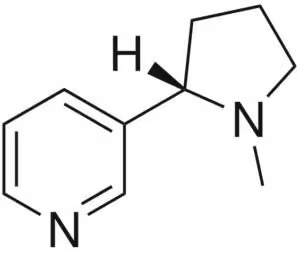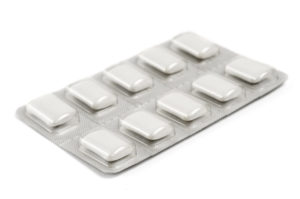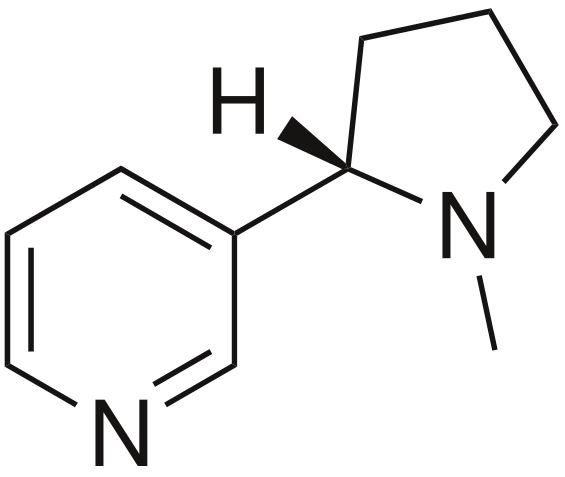Table of Contents
Click the image above or watch on YouTube
Key Takeaways
- Nicotine has been used for thousands of years for its nootropic properties such as improving concentration, memory, motivation, and mood.
- As a nootropic, nicotine is typically dosed at 1 – 2 mg
- Despite the cognitive benefits of nicotine, it is not recommended to smoke tobacco due to the harmful effects.
- Nicotine can be addictive and cause side effects like increased heart rate, high blood pressure, gastrointestinal problems, and it may promote tumor growth, so its use requires caution.
Nicotine (3-(1-Methyl-2-pyrrolidinyl) pyridine) is an alkaloid found in tobacco leaves. And has been used by humans for its psychoactive (nootropic) properties for thousands of years.
But it is only in the last several decades that nicotine’s mechanism of action in the brain has been revealed.
Nicotine works primarily by upregulating nicotinic acetylcholine receptors (nAChR) in the brain. Increasing neural signaling of neurotransmitters and boosting alertness, cognition and memory.
Studies have shown however that this upregulation of nAChR is dose dependent. And too much nicotine desensitizes these receptors.[i] So low doses of nicotine are key in using nicotine as a nootropic for cognitive benefit.
Since we’re investigating nicotine as a nootropic here, it’s important to point out that I am not encouraging smoking. Smoking tobacco has been shown to increase cognition.
But the harmful effects of tobacco have been proven extensively.[ii] Including this study that showed life-time smokers have less gray matter in the prefrontal cortex compared to non-smokers. Affecting the brain’s reward, impulse control and decision-making circuits.[iii]
Nicotine as a nootropic helps:
- Memory. Nicotine improves short and long-term memory. Nicotine affects nicotinic receptors which increases the use of neurotransmitters that helps with memory formation. And induces long-term potentiation which helps encode long-term memories.
- Neurotransmitters. Nicotine binds to nicotinic acetylcholine receptors in the brain. Boosting the release of acetylcholine (ACh), dopamine, serotonin, and glutamate. Affecting alertness[iv], attention, cognition, memory and mood.
- Brain Optimization. Nicotine modulates the connectivity and structure of brain networks. And improves whole-brain communication efficiency. Boosting overall cognitive and brain function.[v]
Overview
Nicotine (3-(1-Methyl-2-pyrrolidinyl) pyridine) is an alkaloid found most famously in tobacco leaves. But nicotine is also present in very small amounts in plants from the Solanaceae or nightshade family including potatoes, tomatoes and eggplant.[vi]

Nicotine acts on acetylcholine (ACh) receptors in your brain. Stimulating and regulating the release of a host of neurotransmitters including serotonin, dopamine and norepinephrine.
New drugs derived from nicotine and the research on nicotinic receptors are in clinical trials for Alzheimer’s, ADHD, anger management, anxiety, depression, schizophrenia, Tourette Syndrome and wound healing.[vii]
As a nootropic, we’re talking about using a nicotine lozenge or gum for cognitive function enhancement. I am NOT talking about smoking tobacco.
Smoking is the cause of 5 – 6 million deaths per year. Affecting 18 different organs in your body. But it’s not the nicotine in tobacco that kills.
The biggest issue with using nicotine as a nootropic is that it can be addictive. But it’s not the nicotine that causes cancer. Nicotine however could be a “tumor promoter”.
Nicotine binds specifically to the nicotinic acetylcholine receptor (nAChR) in your brain. And it deregulates essential processes like regulation of cell proliferation, apoptosis (programmed cell death), migration, invasion, angiogenesis, inflammation and cell-mediated immunity of stem cells, adult tissues and cancer cells.[viii]
As a nootropic, taking nicotine in smalls doses (i.e. 1-2 mg) and used occasionally helps when you need that cognitive boost. If you have cancer or a tendency to tumor growth you should avoid using nicotine.
How does Nicotine work in the Brain?
Nicotine boosts brain health and cognitive function in several ways. But two in particular stand out.
- Nicotine boosts memory. Nicotine binds to presynaptic nicotinic acetylcholine receptors in the brain. And boosts the release of acetylcholine (ACh), dopamine, serotonin, and glutamate.[ix] Neurotransmitters known to be involved in cognitive processes.
Problems with cholinergic signaling has been implicated in neurologic disorders including schizophrenia, ADHD and addiction. And much of the study of nicotine’s effects on cognition has been done looking for treatments for these disorders.[x]
The National Institute of Drug Abuse conducted a meta-analysis of 41 double-blind, placebo-controlled studies between 1994 and 2008. The analysis found significant positive effects of nicotine on fine motor performance, alertness, attention and accuracy, response time, short-term and working memory.[xi]
- Nicotine improves attention. Attention deficits are often associated with those dealing with ADHD. The inability to focus can cause all kinds of problems both in relationships, and on the job.
Nicotine has been shown to improve attentiveness in smokers. And helps alleviate attention deficits in Alzheimer’s Disease, schizophrenics and adults with ADHD.
A double-blind study conducted at Duke University Medical Center used nicotine patches to see if it would improve attentiveness in non-smoking adults without attention deficits. Subjects received 7 mg of nicotine per day using a transdermal patch for a 4 ½ hour morning session.
Nicotine significantly decreased the number of omission errors during testing. And in this study, decreased the variance in “hit reaction time” which is used a measure of attentiveness.
The study showed that nicotine reduced attention deficit, and even improved attentiveness in normal adult non-smokers.[xii]
How things go bad
As we get older, our brain chemistry and energy metabolism changes.[xiii]
↓ Acetylcholine signaling in the brain declines
↓ Dopamine, norepinephrine, epinephrine and serotonin levels decline
↓ Alertness, attention and memory declines
↑ Anxiety, depression and stress increases
All of these age-related changes are contributing factors to the neurodegenerative diseases of aging, including Alzheimer’s and dementia.
Nicotine benefits
Nicotine boosts levels of dopamine, epinephrine (adrenaline), norepinephrine and serotonin. And human cell lines in test tube studies as well as animal studies show nicotine stimulates the growth of new blood vessels. Even increasing the number of red blood cells.
Nicotine rapidly crosses the blood-brain barrier. Within 20 seconds of putting a nicotine lozenge under your tongue. It has the fastest action of any nootropic I have reviewed here on Nootropics Expert.
Alpha brain waves increase with nicotine which provides a relaxed state associated with super-learning, flow states and joy.[xiv]
Nicotine stimulates electrical and neurotransmitter activity throughout your brain. Helping alertness, mood, motivation, selective attention, sustained attention, and decreases distraction.[xv]
Nicotine helps pre-attentional processing which is your ability to detect information. It brings you down when you’re up. And it brings you up when you’re down. And it helps you cope with stress and anxiety.
And nicotine improves short-, long-, and working memory processes.[xvi]
How does Nicotine feel?
Neurohackers report nicotine improves mental clarity and motivation. Mood swings are minimized and less anxiety.
Concentration and focus significantly get a boost with nicotine as a nootropic.
All forms of memory get a boost with nicotine. Short and long-term memory. And working memory. Nicotine induces long-term potentiation in the hippocampus which is the basis for the neuroplasticity that helps encode long-term memory.[xvii]
The key with nicotine is to use low doses. And only use it occasionally. Too much nicotine desensitizes the alpha-7 nicotinic acetylcholine receptor. So tolerance is an issue. But your receptors recover fairly quickly if you give them a break for a day.
Nicotine Clinical Research
Much of the research conducted with nicotine was done with cigarette smokers. The studies were to determine the effects of abstinence (quitting smoking) on cognition. Or funded by tobacco companies out to prove smoking was good for you (i.e. improved cognition). Cigarette smoke is harmful.
So keep an open mind when reviewing these studies. My intent is certainly not to encourage smoking. But to show the effects of nicotine regardless of the delivery system to the human brain.
Nicotine boosts IQ
Researchers in New Zealand conducted a trial with 10 women and 6 men ranging in age from 18 – 32 years. All participants were smokers and were instructed not to smoke during the 2-hour period prior to the experiment.
Each subject completed the even and odd numbers of the Raven’s Advanced Progressive Matrices (APM) test in two sessions. APM is a test to measure intelligence (IQ).
In each of 2 experimental sessions, subjects were given 20 minutes to complete the assigned half of the APM. Before beginning the test, subjects took 6 puffs of a medium (0.8 mg) cigarette every 20 seconds. After 10 minutes, subjects were prompted to take 2 additional puffs.
Results of the experiment showed that APM scores were significantly higher in the smoking session compared to the non-smoking session. Suggesting that nicotine acts to enhance intelligence.[xviii]
Another study at the University of Colorado may explain part of this boost in IQ. Nicotine was found to increase the efficiency of neural communication between areas of the brain involved in cognition. And even the rest of the brain.[xix]
Nicotine improves typing speed
 Researchers conducted 5 experiments to study the effects of using 2 mg of nicotine on keyboard typing speed. In study after study nicotine produced a reliably consistent increase in typing speed.[xx]
Researchers conducted 5 experiments to study the effects of using 2 mg of nicotine on keyboard typing speed. In study after study nicotine produced a reliably consistent increase in typing speed.[xx]
Nicotine will also improve and increase the speed of your handwriting. Scientists in Germany noted that nicotine has consistently been shown to improve psychomotor performance. So they recruited 38 smokers and 38 non-smokers to participate in a study.
Both groups received gum containing 0, 2 or 4 mg of nicotine. And their handwriting performance was assessed after they chewed the nicotine gum. Subjects were asked to perform a simple writing task. Movement time, velocity and acceleration of handwriting movements were measured.
Nicotine reduced movement times, increased writing velocity and more fluid handwriting movements were observed. The results suggested that nicotine can enhance psychomotor performance to a significant degree in a real-lie motor task.[xxi]
Nicotine boosts memory
Nicotine has been shown to improve short-term and working memory in several studies. In this study conducted in the UK, researchers recruited 60 smokers and 60 non-smokers in a double-blind procedure.
Half of the subjects chewed nicotine gum and the other half chewed a placebo prior to performing a memory task. Results showed that nicotine significantly improves short-term memory.[xxii]
Nicotine for the treatment of ADHD
Several studies have shown the benefits of nicotine in treating the symptoms of ADHD. Focusing and memory break down in those of us with ADHD and ADD. And treatment with Ritalin, Adderall or other stimulants often corrects this inattentiveness and memory impairment. But it does nothing for the accompanying depression and anxiety.
And this is the reason many Adult ADHD sufferers smoke. This study showed that using a nicotine patch not only helped decrease anxiety and depression symptoms of ADHD. It also helped smokers stop using tobacco products while taking care of their ADHD symptoms.[xxiii]
In this study, nicotine was compared to the effects Ritalin and or a placebo had in treating ADHD. Nicotine improved performance and reduced errors. It decreased depression, and decreased overall severity of ADHD symptoms.[xxiv]
Another double-blind, placebo-controlled trial worked with 6 smokers and 11 nonsmokers with Adult ADHD. Nicotine decreased ADHD symptoms, increased vigor, and improved reaction time.[xxv]
Nicotine Recommended Dosage
Nicotine as a nootropic is dosed at 1 – 2 mg on an as needed basis.
Nicotine gum typically comes in 2 – 4 mg. You can cut a 4 mg piece of gum in half for a 2 mg dose. Gum releases the nicotine dose over the course of 20 – 30 minutes.
The problem with nicotine gum is aspartame along with other unhealthy sweeteners.
Nicotine patches come in varying strengths and usually contain more nicotine than gum or lozenges. Neurohackers (contrary to package warnings) cut the patch to size depending on the dose they want to use.
My preferred method is nicotine lozenges. Mini-lozenges are best because they’re not full of toxic chemicals like larger lozenges. The 2 mg mini-lozenge cut in half provides cognitive benefits within 10 – 20 minutes.
Nicotine Addiction & Other Side Effects
Nicotine is addictive primarily because it boosts levels of dopamine in your brain.[xxvi] Not nearly as addictive as smoking tobacco or chewing tobacco but addictive nonetheless.
Nicotine can cause increased heart rate, high blood pressure, dizziness, cough, sneezing, sinus problems, upset stomach, constipation, and headaches.
Nicotine does not “cause” cancer. But may be a tumor promoter. So if you had or currently have cancer you should avoid nicotine.
If you are dealing with a gut infection of H pylori bacteria, you should not use nicotine until you get this problem under control.
Type of Nicotine to buy
Nicotine used as a nootropic comes in gum, inhalers, lozenges, and transdermal nicotine patches.
See “Nicotine Recommended Dosage” for specific dosing instructions.
Nicotine Gum & Pouches
I have tried and recommend the nicotine gum by Lucy Nicotine. Lucy uses pharmaceutical grade nicotine and natural ingredients only in their pouches and gum. Check them out here: Lucy.co Nicotine.
Nicotine Spray
Nicotine spray is a newer option you may want to try. You get a 1 mg dose for each spray under your tongue (sublingually). Great for a quick cognitive boost and burst of energy. There’s about 100 sprays in each container.
Nicotine Vaping
Vaping is another option. But it can come with a host of potential issues if you’re not familiar with vaping. The safest option is rebuildable coils using stainless steel wire and organic cotton with vegetable glycerin as your nicotine base. And keeping the temperature low and power less than 4 volts.
Of course there is also cigarette smoking and chewing tobacco for your nicotine dose which I DO NOT recommend.
Nootropics Expert Recommendation
Nicotine 1 – 2 mg per dose
 I recommend using Nicotine as a nootropic supplement.
I recommend using Nicotine as a nootropic supplement.
Your body does not make nicotine on its own. So if you are going to supplement with nicotine, you must take it as a supplement.
Nicotine is helpful for those dealing with short-, long-term and working memory problems, low energy, depression or anxiety.
Nicotine is especially helpful for dealing with the symptoms of Adult ADHD. Nicotine can help relieve many of the symptoms of ADHD. And is a good compliment to your existing ADHD meds.
While nicotine is a powerful cognitive enhancer, it is also addictive and can lead to tolerance and withdrawal symptoms in some people. So caution is advised. And if you’re prone to addiction please stay away from nicotine as it can lead to nicotine addiction.
As neurohackers, we have great acetylcholine agonists available to us if you don’t want to experiment with nicotine. Most of the racetams will boost acetylcholine use in the brain.
I suggest starting with a dose of ½ – 1 mg of nicotine in mini-lozenge or spray form. Nicotine will compliment nearly everything in your current nootropic stack.
There is no benefit to dosing more than 2 mg of nicotine for cognitive benefit. And too avoid addiction and tolerance we suggest only using nicotine occasionally.
I have tried and recommend the nicotine gum by Lucy Nicotine. Lucy uses pharmaceutical grade nicotine and natural ingredients only in their pouches and gum. Check them out here: Lucy.co Nicotine.










Join The Discussion - 124 comments
Arthur
October 24, 2022
This was an eye opener, thank you for putting this together. I have mast cell activation syndrome, and cannot drink coffee due to the mold common in almost all reasonably priced brands. I’ll try nicotine gum, as that’s the only available option right now. I reckon i could have one 2mg gum after lunch (15:00) everyday, as that’s when i need a boost. Should i be mindful of adrenal fatigue after prolonged use, as coffee drinkers often should? Perhaps not supplementing on Fridays and weekends to let the receptors and adrenal glands “recover”?
David Tomen
October 24, 2022
Arthur, it depends on how you respond to nicotine. The only way to find out is to try it.
Frank
October 8, 2022
You said the 2mg lozenge cut in half takes effect in 10-20 minutes? How long does it last? Does the effect using a whole 2mg lozenge last longer?
If using a 7mg patch cut to size (in fourths?), how long for that to take effect, and then how long does it last?
David Tomen
October 9, 2022
Frank, low does nicotine dissolved under your tongue for 20 minutes should provide its benefits for 2 – 3 hours. The key to making this work is a low dose (i.e. 1 mg nicotine).
A higher dose desensitizes receptors which means you will not get the benefits you would with a lower dose. And it takes a day or so for those receptors to recover. Which is why nicotine is used infrequently and “as needed” for nootropic benefit.
I have not compared patches to sublingual lozenges so not sure how long it takes for the benefits to kick in. Maybe someone reading this can share their experience with patches and if they work.
Hosein
October 3, 2022
I just say thank you a lot for this great website. I’m gonna use this guide for nicotine.
John D
September 19, 2022
If you are someone that uses caffeine daily, would you recommend reducing or stopping caffeine while using nicotine? thank you
David Tomen
September 20, 2022
John, caffeine and nicotine are two completely different substances. See my review on caffeine to see how it compares to nicotine: https://nootropicsexpert.com/caffeine/
George
September 2, 2022
Hi, do you think nicotine can lower sex drive or cause problems like erectile dysfunciton in the long term?
This article suggests it does
“Can vaping cause erectile dysfunction in men”
What do you think about this? Does this apply to nicotine gum?
David Tomen
September 3, 2022
George, vaping and/or smoking can cause ED because of excess nicotine and all the other toxins found in tobacco and vape juice.
As a nootropic, using 1 mg nicotine sublingually once in awhile should not have any effect on erections.
Mark
August 25, 2022
David, I’ve found some studies that suggest nicotine may deplete methylfolate. I’ve had a few recent labs that all indicate my B-9 status has fallen significantly since I began using 3mg of nicotine via pouch daily a few years ago. My questions are have you read the same findings and do you think nicotine could cause this depletion provided the user is not supplementing with methylfolate?
David Tomen
August 31, 2022
Mark, smoking messes with methylation but studies do not specifically point to nicotine. It could be nicotine that is the culprit however. Methylfolate is in integral part of methylation. So if you have found it has dropped since you started supplementing with nicotine then it sounds like nicotine does have an affect on your folate levels.
If that’s true the best thing you could I think is supplement with a bioactive B-Complex (https://geni.us/8Ig2A) (Amazon).
Mark Painter
August 31, 2022
David, thanks very much for your time and attention, sir. I’ll start on an activated B-9 tomorrow.
Adam
August 22, 2022
whats the relationship with nicotine (also other nootropics) and h pyroli bacteria? i suspect i have pyroli like probably many do, but im taking caffeine and planning to try nicotine.
David Tomen
August 23, 2022
Adam, supplementing with nicotine will increase H pylori bacteria.
Jenn
August 11, 2022
So how long would the effects from a 1-2mg dose last for? And while you should skip a day in between, is there any issues with taking two doses in a day?
David Tomen
August 14, 2022
Jenn, the half-life of nicotine is about 2 hours. Using two doses per day should not be a problem except using it every day will cause dependence.